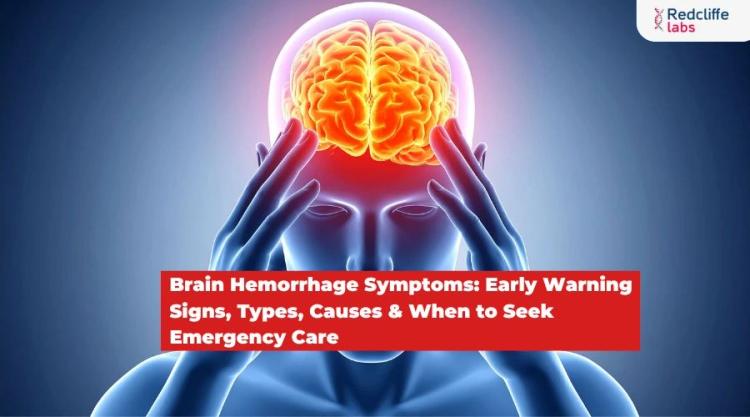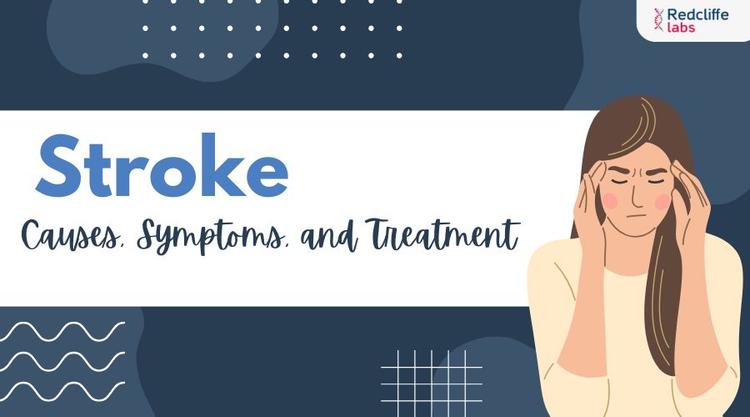Blood Clots in the Brain: Understanding the Symptoms and Risks

Medically Reviewed By
Dr. Geetanjali Gupta
Written By Kirti Saxena
on Aug 26, 2024
Last Edit Made By Kirti Saxena
on Jul 19, 2025

A blood clot is the natural process that prevents excessive bleeding when you are injured. A blood clot is when the blood vessels in your brain start narrowing to stop blood flow to other body parts. This can cause severe health conditions like seizures, headaches, and more. However, in severe cases, blood clots in blood can cause permanent disability or even death.
Let's understand what causes blood clots in the brain, its symptoms, diagnosis, and treatment to detect and manage the
What exactly is a blood clot in the brain?
Blood clots can be a silent threat and can be deadly when they form in the brain. The condition, also known as cerebral thrombosis or cerebrovascular accident (CVA), occurs when blood clots a blood vessel in the brain. This blockage prevents the blood from reaching certain brain areas, which can lead to cell death and brain damage. It can cause strokes, which are medical emergencies requiring immediate attention.
What are the types of blood clots in the brain?
There are two major types of blood clots in the brain-
Ischaemic strokes
Ischemic strokes happen when a blood clot blocks a blood vessel that supplies blood to the brain. This type of stroke is the most common, accounting for about 87% of all strokes. The lack of blood flow deprives the brain cells of oxygen and nutrients, which can result in rapid death.
Hemorrhagic Stroke
A hemorrhagic stroke occurs when a blood vessel in the brain ruptures, leading to bleeding within or around the brain—the pressure from the leaked blood results in damage to brain cells. While less common than ischaemic strokes, hemorrhagic strokes are often more severe.
What Causes Blood Clots in the Brain?
Several factors can increase the likelihood of blood clots forming in the brain:
- Sedentary lifestyle—People not involved in any type of physical activity are at higher risk of developing blood clots in the brain.
- Age- People aged above 55 years who have hypertension and diabetes, followed by brain stroke, may increase their chances of blood clots in the brain.
- Family history- If you have a family history of brain stroke or diseases like diabetes or high blood pressure, these can lead to blood clots in the brain.
- High Blood Pressure- Hypertension is a substantial risk factor for both types of strokes.
- Atherosclerosis—Over time, fatty deposits in the arteries can lead to blockages and make it easier for blood clots to reach the brain.
- Heart Disease- Conditions like atrial fibrillation can cause blood clots in the brain.
- Diabetes- If you have diabetes or have uncontrolled sugar levels, it can damage your blood vessels and increase clotting risks.
- Smoking- Smoking may damage your blood vessels and promote clot formation.
- Obesity- Being overweight can increase the risk of developing conditions like high blood pressure and diabetes, which can create clots in the brain.
What are common blood clots in brain symptoms?
Blood clots in the brain can result in several symptoms. Let's understand these symptoms in detail.
Sudden Numbness or weakness- You may suddenly lose strength or feel numb in these areas. This can range from a weakness in milk to complete paralysis on one side of the body. The weakness might make it difficult to smile or even raise both arms.
Location- This symptom typically affects the face, arm, or leg, usually on one side of the body.
Confusion and Trouble Speaking or Understanding Speech
A person with a blood clot in the brain may suddenly have difficulty speaking clearly. Their speech may become slurred or unclear. In addition, some people might have trouble understanding what others are saying.
Sudden Vision Problems
In this condition, the people might become blurred or completely lost in one or both eyes. Some people experience double vision or see flashes of light.
Severe Headache
A sudden or severe headache with no known cause can indicate a blood clot in the brain. It may be accompanied by neck stiffness, vomiting, or altered consciousness. This symptom is common in hemorrhagic strokes, where bleeding in the brain occurs due to a ruptured blood vessel.
Dizziness or Loss of Balance and Coordination
A person might feel lightheaded, dizzy, or as if the room is spinning. This can make it challenging to stand or walk straight.
People with blood clots in the brain may experience a sudden loss of coordination, making it problematic to perform simple tasks or move around without stumbling.
Sudden Loss of Consciousness or Fainting
Sometimes, a blood clot in the brain can cause sudden unconsciousness or fainting. This may occur if the clot significantly disrupts blood flow to critical regions responsible for supporting alertness.
Seizures
In some people, blood clots in the brain can trigger seizures. Seizures may involve convulsions, loss of consciousness, or uncontrollable jerking movements.
How do we Recognize and respond to symptoms of blood clots in the brain?
If you or someone you know is experiencing the above symptoms, then it's important to seek medical attention immediately. Early intervention can prevent long-term damage and increase the chances of recovery. Remember this acronym FAST to recognize stroke symptoms quickly:
- F- Face drooping
- A-Arm weakness
- S- Speech difficulties
- T- Time to call emergency services
How to Diagnose Blood Clots in the Brain?
The blood clots in the brain can be diagnosed using the following methods-
- Imaging tests, including CT scans, MRI Scans, and Doppler Ultrasound.
- Blood tests to detect conditions like high cholesterol or clotting disorders.
- Cerebral Angiography to visualize blockages in the brain.
What are the Possible Risks & Complications Related to Blood Clots in the Brain?
Here are some possible risks and complications of blood clotting in the brain-
- Permanent Brain Damage
- Stroke
- Paralysis
- Speech and Language Problems
- Cognitive Impairments
- Death.
What are the treatment options for blood clots in the brain?
Yes, the treatment for blood clots in the brain depends on the type of severity of the stroke.
- Medications—Your doctor may recommend medications to dissolve clots in ischaemic strokes. Anticoagulants and antiplatelets can also prevent further clotting.
- Surgery- In some cases, you might need surgical procedures like thrombectomy (removal of the clot) or aneurysm clipping (for hemorrhagic strokes).
- Rehabilitation- Post-stroke rehabilitation, including physical, occupational, and speech therapy, is crucial for recovery.
- Blood thinners are also recommended to treat the blood clots in the brain.
How can blood clots in the brain be prevented?
Well, there are no definitive ways to prevent brain blood clots. But you can reduce the risk by changing your lifestyle and medical interventions:
- Maintain a Healthy Diet—Eat a healthy diet rich in whole grains, fresh fruits, and vegetables to lower your risk of blood clots.
- Exercise Regularly- Physical activity helps maintain healthy blood pressure and weight, reducing clot risk.
- Quit Smoking- Smoking cessation significantly lowers the risk of stroke.
- Manage Chronic Conditions- Get your health issues like Hypertension, diabetes, and high cholesterol under control.
- Take prescribed medications- Get your medicines timely without any failure or skipping to get your vitals in check.
- Regular Check-Ups- Get routine health checkups to detect and manage your risk factors early.
The bottom line
The blood clot in the brain can cause severe damage to the brain or even death. However, you can prevent yourself and your loved ones from experiencing these conditions by taking preventive measures. If you suspect you or someone else may be experiencing a stroke, seek immediate medical attention. Get your vitals checked with a reliable diagnostic lab, Redcliffe Labs, and consult your reports with your doctor.
FAQ’s
1. Is it Risky to Have a Blood Clot in the Brain?
A. Yes, having a blood clot in the brain is extremely risky. Blood clots can lead to strokes, which can cause permanent brain damage, disability, or death. Early intervention and treatment can reduce your risk of complications.
2. Is blood clots in the brain dangerous?
A. Yes, a blood clot in the brain is extremely risky and can lead to life-threatening conditions such as a stroke. When a clot blocks the blood flow to the brain, it deprives brain cells of oxygen, leading to their rapid death. This can result in permanent brain damage, paralysis, loss of speech, cognitive impairments, or death.



